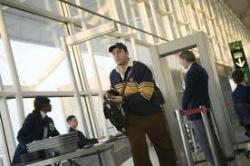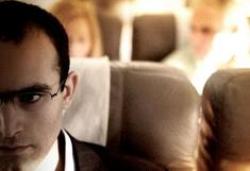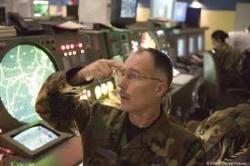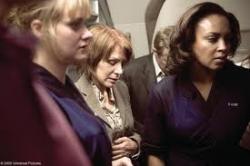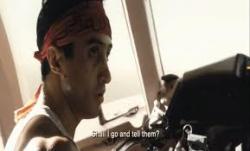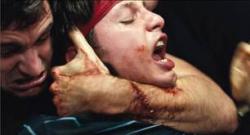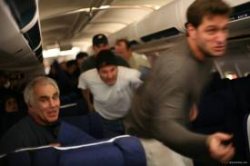With God on our side...
By Michael Roberts
British director Paul Greengrass carved a name as a political filmmaker interested in cinema of social consciousness and institutional corruption via some notable examinations of the 'troubles' in Northern Ireland. He wrote and directed the excellent 'Bloody Sunday', which looked at the 1972 Belfast confrontation, and he wrote the screenplay for 'Omagh', which examined the 1998 bombing there that shocked the world. Both films took an essentially documentary approach in reconstructing a 'fly on the wall' look at events, eschewing melodrama or overt manipulation, allowing the viewer to observe and reflect. The 911 catastrophe was possibly too fraught for American filmmakers to tackle so soon after the horrific events, but Greengrass brought his docu-realism to the subject and constructed a remarkable and important film in the process.
A couple of men are praying in the morning in their hotel room, "it's time", one says to the other, and they set out for the airport. At Newark, New Jersey, pilots and crew are preparing for an early morning United Airlines flight to San Francisco. Passengers gather at the terminal and make phone calls, to loved one's or for business, including one of the men seen earlier at prayer, he concludes his call with "I love you". At Air Traffic Control we see men going about their work as usual, until one notices something strange about a flight out of Boston, it's un-contactable and has made an unscheduled turn towards New York, and they interpret cockpit conversations to mean it's been hijacked. United 93 is delayed for some time in a queue on the tarmac, causing nervousness amongst some to the passengers. It becomes airborne just before reports come through of a small plane hitting one of the World Trade Centre towers. A military command centre is seen dealing with the confusion and chaos surrounding the morning, and they liaise with civilian controllers in trying to unravel the sequence of events, as it's apparent more planes are being hijacked.
Greengrass lets events unfold in real time, and it gives a real sense of the confusion that authorities had, unused to dealing with a hijack situation. The military uses it's chain of command in order to clarify the 'rules of engagement', if they are to send fighters out to shoot down civilian planes, but it takes time and needs to escalate all the way to the President. The terrorists on the plane finally make their move and take over United 93, one of them strapping a fake bomb to his torso, and set out for the Congress building in Washington. The crew and passengers of the flight are in touch with people on the ground via their phones and soon learn that two planes have hit the Twin Towers and resolve to do something to stop their own plane doing the same. The passengers arm themselves with rudimentary weapons and storm the cockpit, fighting for control over the jet. Other passengers make calls to family and tell them, "I love you".
The film avoids becoming preachy, either with the demonisation of the terrorists, or with the glorification of the victims. Greengrass avoids any obvious political interpretation in favour of building the story by increments. Even though we know what will happen, the tension is unlocked by watching what people must have went through in the lead up to the final action. Greengrass builds the sense of dread by an aggregation of small incidents, the almost subliminal accretion of detail that his methodology entails pays off by giving the viewer a sense of connection and involvement. Greengrass understands that in order for his audience to see the humans caught in a larger than life event we need to see the mundane, the banal. That goes for the perpetrators of the event as well as the innocent victims.
It seems the closest Greengrass came to making a political point was with the original closing card, "America's war on terror had begun". After some objections it was replaced with the seemingly neutral, 'Dedicated to the memory of all those who lost their lives on September 11 2001'. The final version is as much of a political statement as the first, as it directly implies a dedication to the terrorists as well, given they also died on that day. It may be a subtle way of saying that the perpetrators of the tragedy were in many ways victims too, possibly as much as the people they took with them. The line of reasoning for this conclusion is only available if you acknowledge the role of fundamentalist religion in the event. Greengrass makes the subtle point by showing both sides praying to a god, the irony being that the Muslim god and the Christian god (and the Jewish god for that matter) are one and the same, the god of Abraham. The terrorists were in the thrall of thinking that was commonplace not that long ago in Christianity. The Muslim religion has not had the rigours of a modern enlightenment to incorporate the criticism and secular thinking that Christianity has been made to. In this light, the terrorists were merely falling into the exploitation of powerful institutional forces, i.e. the extremist Mullahs and their sacred books.
The economic injustices between the 'have' Western world and the 'have-not' Third world is a greater root cause of the core issues 911 threw up. Religion is in an unwelcome complicator. How much more difficult would it be for an extremist Imam to get impressionable minds to sign up to Jihad without the economic disenfranchisement that plagues the poorer countries? Even a group of English working class Muslim lads from Leeds were convinced to strap bombs to themselves and ride the Tube in 2005 and wreak death and chaos. There is no simple answer, but food in the bellies of the 'victims' of western decadence and a working wage to create a more equitable planet would be a start. The Muslim world doesn't hate America for it's "freedom", and most of it, if it had a chance, would understand average Americans want the same thing as the average Iraqi, or Afghani i.e. to live in dignity and love with their family and friends. Americans should have access to information that would at least let them draw that conclusion.
Information is king, and good information even more so, and it's to be hoped that eventually people on both sides of this issue realise what is at the heart of this film, that people are the same everywhere. One-sided information gives poor results, whether it's a fundamentalist Christian massacring innocents in Norway, or others blowing up legal abortion clinics in the US. Believers who will fly a passenger plane into a high-rise building in the name of their invisible friend are only part of this compelling and human story. They were not psychopaths, not monsters, just utterly convinced in the righteousness of their deluded mission. Showing those people a measured and humane response would have been a good start to winning hearts and minds, instead we got the 'war on terror'.... as if it's a 'war', as if 'terror' can be a target, as if it can be won.
And so it goes.

